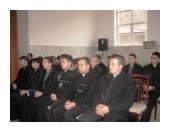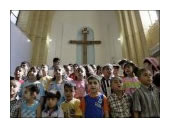ENDEAVOUR FORUM AD2000 ARTICLES - BABETTE FRANCIS
GRACE UNDER FIRE: ORDINATIONS, AND FIRST HOLY COMMUNION IN IRAQ
Babette Francis
The deterioration of religious rights in the Muslim world is increasing the exodus of Christians and severely eroding formerly robust Christian communities in the Middle East, says a report from the Hudson Institute's Center for Religious Freedom.
"Middle Eastern Christians are facing a profound and unprecedented crisis as they retreat from the region in both numbers and influence," says the 800-page report, World Trends in Religious Freedom, released late last year in Washington DC. Native Christian communities, some two millennia old, and numbering around 14 million, are in decline. When Pope Benedict XVI meets envoys from the Middle East, he always expresses great concern about the plight of Christians in their region.
Out of a population of 27 million Iraqis, Christians account for around 800,000 (3%), divided into various rites and denominations. A 1987 census estimated that members of Christian communities amounted to 1.4 million. The drop is mainly due to growing emigration: around 100,000 have left since the start of the Iraq war in March 2003.
Many go to Jordan. According to UNHCR estimates, in the first four months of 2006, Christians were the largest group of new refugees in Amman. The United Nations High Commissioner for Refugees estimates that 44% of Iraqis seeking asylum in Syria are Christians. There is also much migration to Turkey, Sweden and Australia.
Internal displacement towards the more peaceful Kurdistan is also widespread. Karacosh, 67 km from Arbil, until recently had 30,000 residents, more than 90% of them Catholics. Now population figures have climbed to 50,000 following the arrival of many families from Baghdad and Mosul.
Some US Christians groups are pushing for the creation of a semi-autonomous “Assyrian region” on the plains of Niniveh in Iraq's north on the border with Kurdistan to save Iraq's Christians. However, Iraqi priests in Europe note that the Niniveh project “reduces Christians to an ethnic group in a ghetto and puts an end to the Church’s mission which is that of working and witnessing the Gospel among nations.”
The Catholic charitable organization Aid to the Church in Need Aid which provides
humanitarian aid for many Iraqi refugees has produced a 28-minute documentary film on the fate of Iraqi Christians. The film is entitled Quo Vadis: The Iraq Exodus.
Against this bleak picture, Iraqi Catholics show courage.  “A sign of hope amid so much violence and despair” is how Mgr Louis Sako, Chaldean Archbishop of Kirkuk, described the ordination of three new deacons that took place last year in Ankawa in Kurdistan. The ceremony took place in the Church of St Joseph and was celebrated by the bishop of Amadhyia and Erbil, Mgr Rabban al Qas. Also present were Mgr Mikha Maqdassi, bishop of Al Qosh, and Mgr Sako himself who as lecturer at the local faculty of theology wanted to express his “support” for the seminarians.
“A sign of hope amid so much violence and despair” is how Mgr Louis Sako, Chaldean Archbishop of Kirkuk, described the ordination of three new deacons that took place last year in Ankawa in Kurdistan. The ceremony took place in the Church of St Joseph and was celebrated by the bishop of Amadhyia and Erbil, Mgr Rabban al Qas. Also present were Mgr Mikha Maqdassi, bishop of Al Qosh, and Mgr Sako himself who as lecturer at the local faculty of theology wanted to express his “support” for the seminarians.
Courses offered by the Chaldean Major Seminary of St Peter and Babel College, the only Christian theological faculty in Iraq, resumed officially last month in Ankawa, after the forced relocation of both institutions from Baghdad, which had become too dangerous.
The ordained deacons are Salar Soulayman Bodagh of the diocese of Al Qosh, Raymond Hamid Sargis of Baghdad and Louya' Gilyana Dinkha from Mosul. Earlier in the year Wassim Sabih Youssif was ordained in Baghdad and four Syro-Catholic deacons were ordained in Mosul: Raid Adil Fatohi, Mazin Isho' Mattoccha, Ammar Abdullahad Ayub and Nuhad Sabih Alcas Moussa.
In Karamles in the church of Mar Addai, a new Chaldean priest Fr Ephram Gallyana, aged 31, was ordained in July 2007. The Bishop of Mosul, Mgr Faraj P. Rahho, celebrated Mass. The new priest belongs to his diocese but for security reasons, the function was held in Karamles, the same settlement where on 4 June the funeral was held of Fr Ragheed Aziz Ganni and of three subdeacons killed with him in Mosul.
Fr. Ragheed and the deacons were killed as they left the church where he had said Mass. The terrorists also planted explosives so that their bodies could not be collected for some hours until the explosives were disarmed. Father Raheed had been offered a parish outside Iraq but chose to return to minister to his people. He did not expect to live more than two years, but God gave him three.
Fr Ephram placed a cross of yellow roses on the tomb of Fr Ragheed with the inscription, “from your brother, Ephram Gallyana”. And, in a sign of the courage with which young priests are preparing to face the difficult times ahead of them in an Iraq martyred by violence, the new priest pledged to “continue the work of Fr Ragheed”.

With new ordinations to the priesthood and children receiving their first Holy Communion, the Christian community in Iraq refuses to give in to the systematic persecution it is subjected to. Fifty-nine children who received their first Holy Communion in Baghdad in July also showed courage. Dressed like novice monks and sisters, the children went to the
Syrian-Catholic Church of Our Lady of Salvation. “I prayed that Jesus returns my father safe,” said 11-year-old Matti. Nine months ago, Matti’s father was kidnapped and he has not been
heard from since.
“Do not succumb to the threats of the evil-doers,” was the appeal made by the Syrian Catholic Archbishop of the capital, Athanase Matti Matoka. “The children have been meeting here for more than a month despite the danger.” He continued: “Many churches in Baghdad have cancelled their annual first communion ceremonies to avoid possible attacks but we decided to go ahead with our programme.”
Happy parents, grandparents and godparents who celebrate the First Holy Communions of their children in free countries like Australia could spare a thought and a prayer for the children of Iraq and their priests - and send a donation to Aid to the Church in Need for Iraqi Christians.
Babette Francis
Member Organisation, World Council for Life and Family
NGO in Special Consultative Status with ECOSOC of the UN